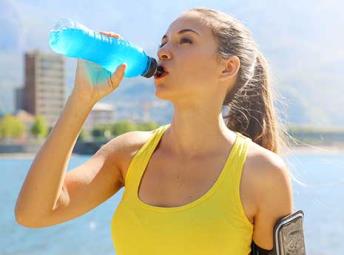Is it possible to get too many electrolytes?
"It's possible," says Jeffrey. "But it's hard to overdose on electrolytes from food. The people who get too much normally do so because they're taking too many or too high a dose of supplements" says Jeffrey.
"For example, too much sodium chloride (salt) can cause high blood pressure in people who are salt sensitive," says Jeffrey. "And someone who takes too much calcium may eventually develop kidney stones or even iron deficiency—a certain recipe for fatigue."
More: 18 Energy-Boosting Fruits Every Athlete Should Try
Here's a look at some of the more common electrolytes, how they impact health, performance, and how to get enough of them into your diet.
Sodium Chloride
"Of all the electrolytes, this is the one runners and other endurance athletes lose the most of in sweat," says Jeffrey. "Sodium chloride (common table salt) facilitates thirst and helps the body retain fluids. It also helps maintain a normal blood pH."
Sodium chloride also supports the function of nerves and muscles, and, together with potassium, maintains the right balance of fluids both inside and outside of cells.
Most people, including casual runners, get enough, if not too much, salt in their diets. But, again, if you run longer than one hour, it's important to replace this electrolyte afterwards.
"Depending on how heavily they sweat, runners lose on average of around 900 mg to 2,500 mg of sodium per hour. You can replace that by adding about a teaspoon of table salt (for 2,330 mg of sodium) to your water, coconut water, or favorite sports drink, if it doesn't already contain sodium," says Jeffrey.
More: Are You Eating Too Much Salt?
Another factor to consider when replacing sodium chloride: some runners lose more salt in their sweat than others.
"Some runners are saltier sweaters than others," Jeffrey says. How do you know if you're a saltier sweater?
"Hang your running hat or shirt to dry after a hard run. If a white, crusty residue forms, that's a good sign you're a salty sweater, and may need to take additional steps to replace this electrolyte after a hard run," says Jeffrey.
You can do that with salty snacks like pretzels, baked chips, cheese or with a sodium-enhanced sports drink or tab. Soups and milk are good sodium sources to include in your general diet or as part of a post-run recovery meal.
More: 8 Heart-Healthy Soups for Athletes
Potassium
"This electrolyte helps support heart function and muscle contractions," says Jeffrey. Because it conducts electrical impulses, potassium facilitates communication between nerves and muscles.
It also facilitates the transport of nutrients into cells and promotes glycogen storage. (A good thing since glycogen is what fuels muscles.) Potassium can also help counter sodium's negative impact on blood pressure.
Potassium deficiency is fairly rare since the body stores ample amounts, it's easy to get enough from food, and we don't lose a lot of potassium, even during hard exercise.
Bananas, sweet potatoes, dark leafy greens and oranges all contain lots of potassium. Include these foods every day or as part of your post-run recovery snack, to keep your potassium levels up to snuff.
More: Check Out the High-Potassium Ingredient in This Coconut Smoothie Recipe
- 2
- of
- 3







Discuss This Article